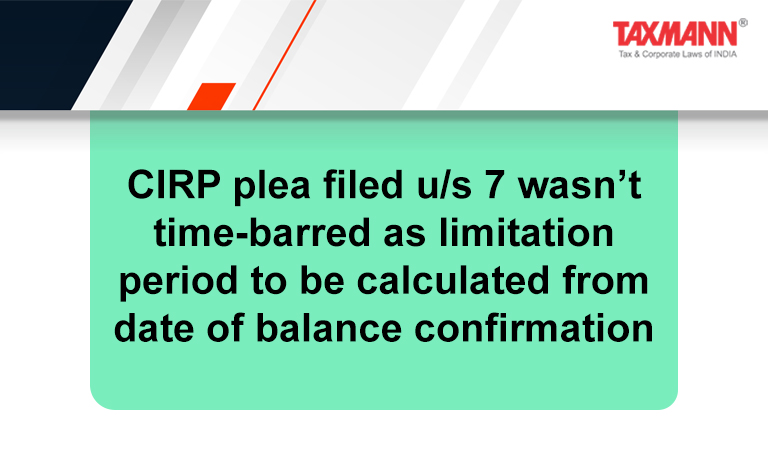CIRP plea filed u/s 7 wasn’t time-barred as limitation period to be calculated from date of balance confirmation
- Blog|News|Insolvency and Bankruptcy Code|
- 3 Min Read
- By Taxmann
- |
- Last Updated on 8 October, 2021

Case Details: Kishore Bachuram Kapdi v. Bank of Maharashtra - [2021] 130 taxmann.com 467 (NCLAT- New Delhi)
Judiciary and Counsel Details
-
- Justice A.I.S. Cheema, Chairperson and Dr. Ashok Kumar Mishra, Technical Member
- Anurag Mishra and Ms. Brinda Ajmani, Advs. for the Appellant.
- Sudeep Singh, Adv., Abhishek Anand and Kunal Godhwani, Advs. for the Respondent.
Facts of the Case
In the instant case, the application under section 7 of the Insolvency and Bankruptcy Code, 2016 was filed by the financial creditor, i.e., respondent-bank before the NCLT. The NCLT admitted the application under section 7 against a corporate debtor by the impugned order.
On appeal, the appellant, promoter, and director of the corporate debtor submitted that the appellant could not appear before the Adjudicating Authority as when the matter was filed the appellant was suffering from COVID and, thus, could not defend the matter before the Adjudicating Authority.
The appellant stated that the application filed under section 7 had suppressed the fact that the financial creditor had even resorted to proceedings under section 13(2) of the SARFAESI Act and had moved the DRT, which proceedings were subsequently withdrawn.
However, it was stated that those facts were not mentioned in the application under section 7. It was also stated that the date of default was not 4-3-2020 as noted by the Adjudicating Authority in the impugned order. The actual date of default was 28-10-2016, which was the date of NPA.
In reply, the appellant stated that the impugned order passed was a non-speaking order as it did not take into consideration all the relevant facts for admitting the application under section 7. The appellant further submitted that Principles of Natural justice required that the appellant was given an opportunity to defend.
The issue raised was that at the stage of admission, the appellant was ex parte and, thus, the impugned order deserved to be set aside. The other ground raised was that the debt concerned was time-barred.
NCLAT Held
The NCLAT noted that the respondent bank had correctly mentioned in Part IV of the Format that the date of NPA was 28-10-2016. It appears an error in recording occurred in impugned order where the date of default has been recorded to be 4-3-2020. When the date of NPA is 28-10-2016 and there is balance confirmation of 15-7-2019, the same is within three years. Calculating the limitation period from 15-7-2019, the application under section 7 filed on 28-7-2020 cannot be said to be time-barred.
As regards, the contention that Principles of Natural Justice were not followed, the law requires that the notice should be issued to the corporate debtor. The appellant has not claimed that the corporate debtor had not received notice.
The appellant submits that the appellant was suffering from COVID at the relevant time. The order of Adjudicating Authority shows that the application was filed on 28-7-2020 and notice was issued on 24-8-2020 and thereafter, there were two dates of hearing but still, the corporate debtor did not appear or file Vakalatnama. When the corporate debtor is a company where there are more directors rather than only one as can be seen from the balance confirmation issued by the company, it does not lie in the mouth of the corporate debtor to claim that one director was suffering from COVID so the corporate debtor could not cause appearance before the Adjudicating Authority.
Thus, there is no reason why before 16-2-2021 when the hearing took place before Adjudicating Authority, the corporate debtor did not approach Adjudicating Authority to seek to defend. There is no substance in the appeal. Hence, it is not admitted.
Case Review
-
- Bank of Maharashtra v. Afcan Impex (P.) Ltd. [2021] 130 taxmann.com 466 (NCLT – Ahd.) (para 13) affirmed [See Annex].
List of Cases Referred to
-
- Bank of Maharashtra v. Afcon Impex (P.) Ltd. [CP (IB) No. 289/7/AHM/2020] (para 1)
- Jagdish Prasad Sarada v. Allahabad Bank [2020] 119 taxmann.com 244 (NCL-AT) (para 3)
- Ms. AKJ Fincap Ltd. v. Bank of India [2021] 127 taxmann.com 875 (NCLAT – New Delhi) (para 3).
Disclaimer: The content/information published on the website is only for general information of the user and shall not be construed as legal advice. While the Taxmann has exercised reasonable efforts to ensure the veracity of information/content published, Taxmann shall be under no liability in any manner whatsoever for incorrect information, if any.

Taxmann Publications has a dedicated in-house Research & Editorial Team. This team consists of a team of Chartered Accountants, Company Secretaries, and Lawyers. This team works under the guidance and supervision of editor-in-chief Mr Rakesh Bhargava.
The Research and Editorial Team is responsible for developing reliable and accurate content for the readers. The team follows the six-sigma approach to achieve the benchmark of zero error in its publications and research platforms. The team ensures that the following publication guidelines are thoroughly followed while developing the content:
- The statutory material is obtained only from the authorized and reliable sources
- All the latest developments in the judicial and legislative fields are covered
- Prepare the analytical write-ups on current, controversial, and important issues to help the readers to understand the concept and its implications
- Every content published by Taxmann is complete, accurate and lucid
- All evidence-based statements are supported with proper reference to Section, Circular No., Notification No. or citations
- The golden rules of grammar, style and consistency are thoroughly followed
- Font and size that’s easy to read and remain consistent across all imprint and digital publications are applied



 CA | CS | CMA
CA | CS | CMA
